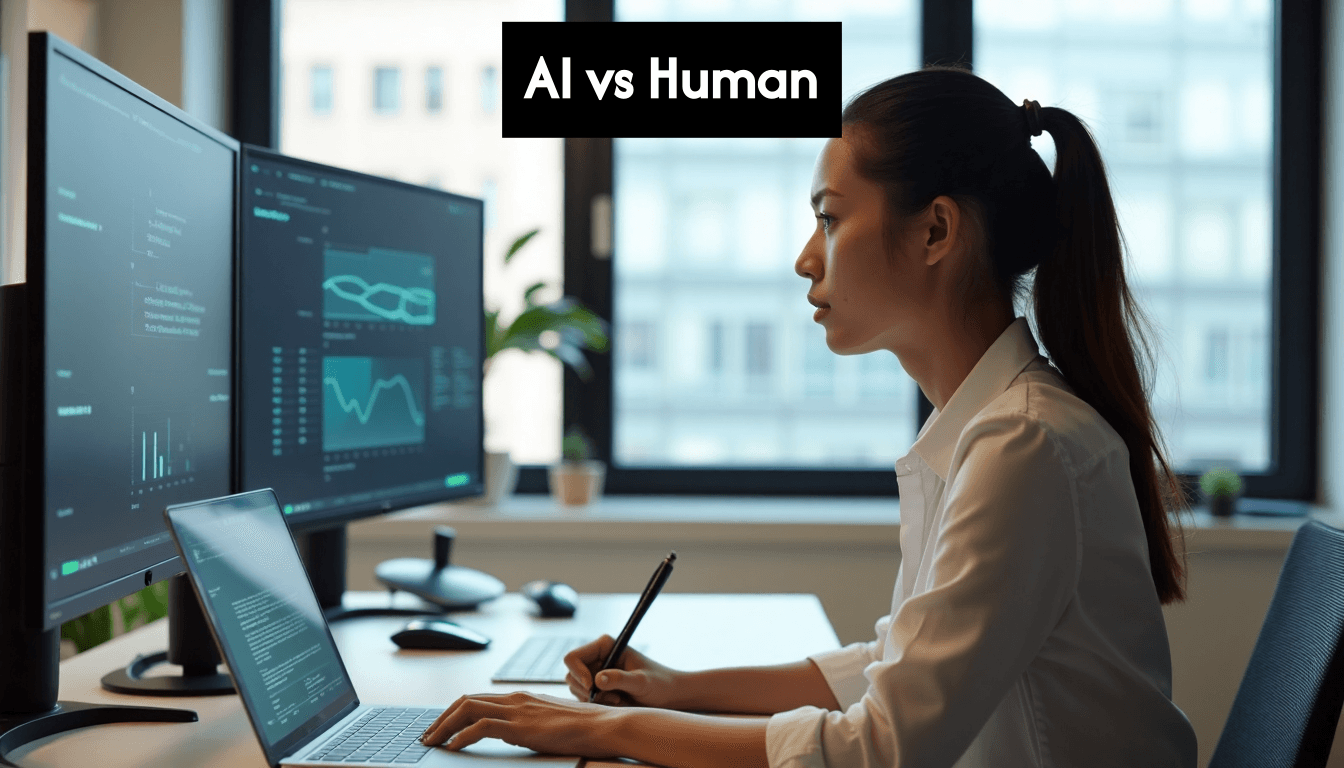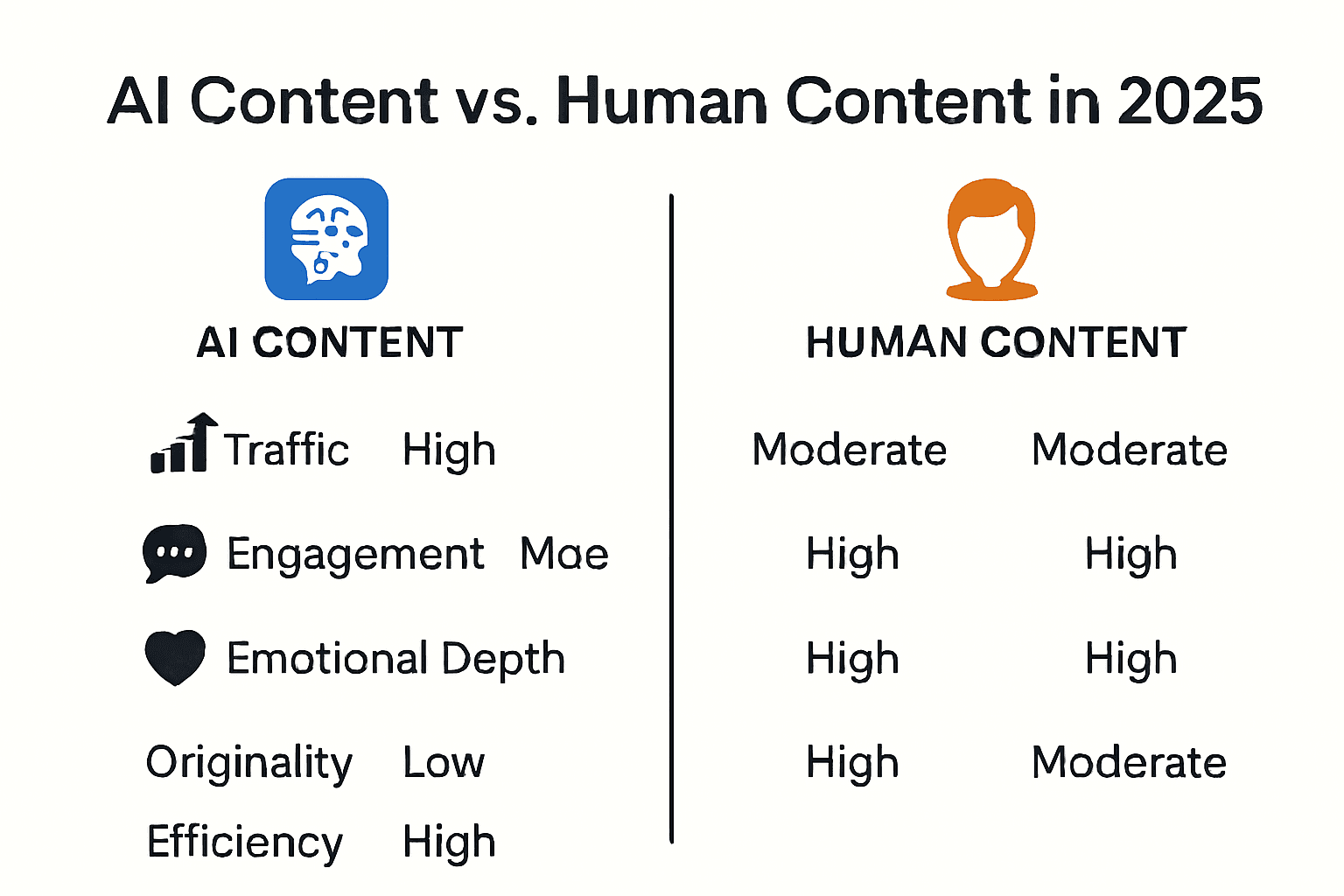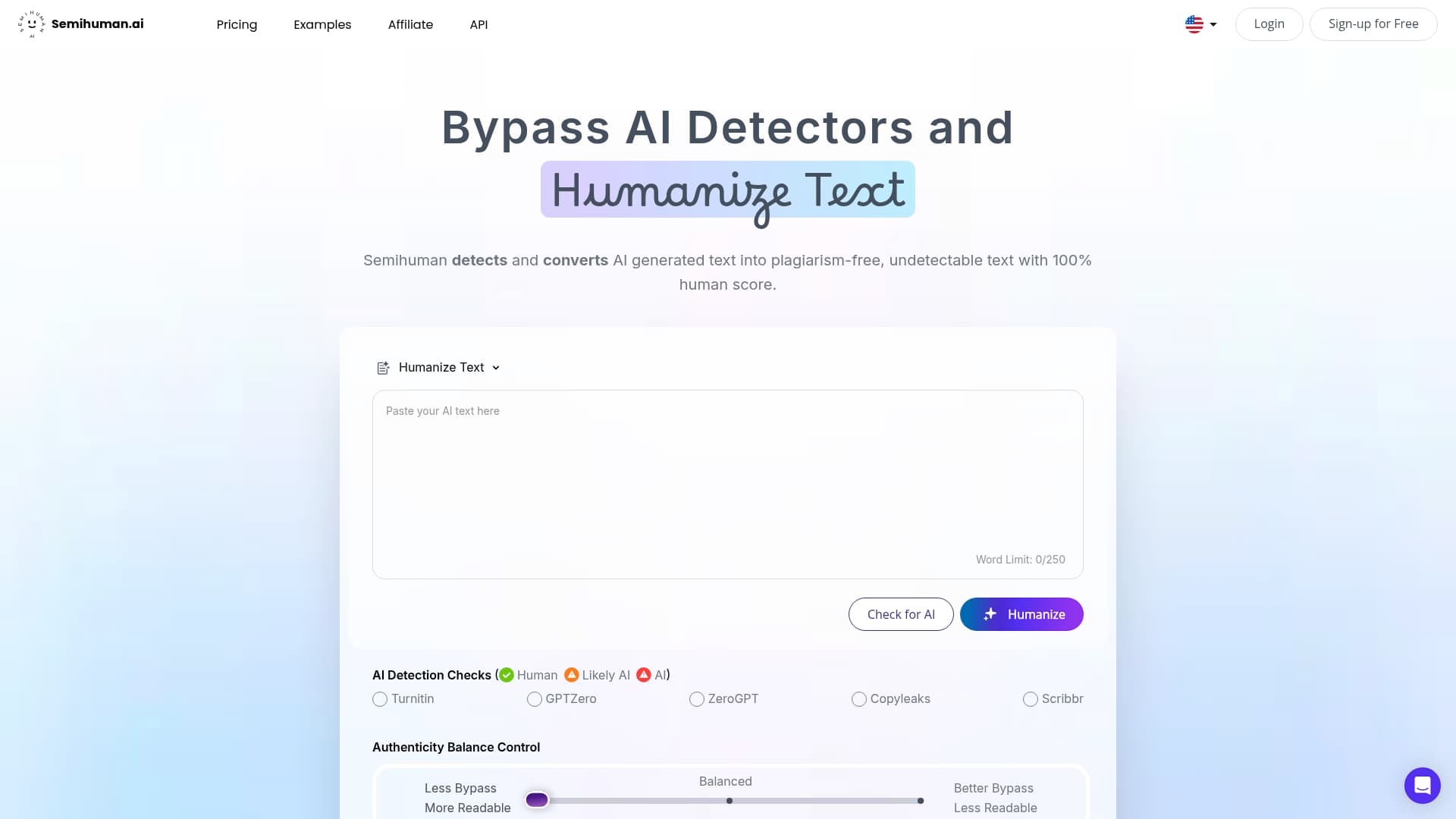Loading...

Everyone is talking about the battle between AI-generated content and human writing in 2025. Here’s something most people miss. Human-written content now gets 5.44 times more traffic and keeps readers engaged 41 percent longer compared to AI-written pieces. Most assume the rise of AI means it has already taken over, but real audience engagement tells another story. What really sets the winners apart is not pure AI or pure human creativity, but the hidden power in combining both. The most effective strategies today are the ones you would least expect.
| Takeaway | Explanation |
|---|---|
| Emotional Intelligence is Crucial | Human writing excels in emotional depth and contextual understanding, aspects that AI struggles to replicate, making it essential for engaging content. |
| Hybrid Content Strategies Are Effective | A collaborative approach using AI for initial drafts and human refinement ensures content remains emotionally resonant and contextually rich. |
| SEO Evolves with AI | As AI-generated content increases, search engines prioritize authenticity and engagement, indicating human-written content continues to outperform in critical metrics. |
| Audience Perception Matters | A significant portion of audiences can distinguish between human and AI content, emphasizing the need for authenticity in industries requiring emotional connection. |
| Tailor Content Generation Approaches | Different content types necessitate balancing AI efficiency with human creativity, so evaluate the specific requirements of your audience and industry. |

The landscape of content creation is rapidly evolving, with artificial intelligence and human creativity presenting distinct approaches to writing. Understanding the fundamental differences between AI content and human writing reveals a complex interplay of capabilities and limitations.
Human writing thrives on emotional depth and contextual understanding that AI currently struggles to replicate. Our guide on humanizing AI text highlights the critical gap between machine-generated and human-authored content. According to a comprehensive study by Carnegie Mellon University, AI language models can mimic writing styles but fail to capture the subtle emotional intelligence that makes human writing truly compelling.
Humans draw from personal experiences, cultural insights, and complex emotional landscapes. A writer can infuse a piece with personal anecdotes, subtle humor, and nuanced perspectives that reflect lived experiences. AI, in contrast, relies on data patterns and statistical predictions, often producing text that feels technically correct but emotionally flat.

Creativity represents the most significant divide between human and AI content. Human writers generate truly original ideas, combining unexpected concepts and drawing from personal imagination. AI systems, while impressive, fundamentally remix existing information. According to research on AI content generation, AI lacks the capacity for genuine creative leap that humans naturally possess.
This limitation becomes particularly evident in storytelling, where human writers craft narratives with unexpected twists, emotional resonance, and deep psychological insights. AI can generate grammatically perfect text, but struggles to create truly innovative narrative structures or explore complex emotional landscapes with authentic depth.
Human writers excel at adapting content to specific audiences, understanding subtle cultural nuances, and responding to complex communication contexts. An experienced human writer can instantly adjust tone, style, and approach based on the intended reader, something AI still struggles to accomplish with true sophistication.
While AI can quickly generate content across multiple domains, it lacks the intuitive understanding of context that humans naturally bring to writing. A human writer can detect subtle humor, sarcasm, or cultural references that would completely perplex an AI system. This adaptability extends beyond mere language processing to genuine communication that connects with readers on a meaningful level.
The future of content creation is not about replacing human writers but finding collaborative approaches that leverage the strengths of both AI efficiency and human creativity. Understanding these core differences allows content creators to use AI as a powerful tool while preserving the irreplaceable human touch that makes writing truly extraordinary.
Search engine optimization has undergone a transformative shift in 2025, with artificial intelligence playing an increasingly complex role in content creation and search ranking strategies. The interplay between AI-generated content and traditional SEO practices has created a nuanced landscape that challenges existing understanding of digital content optimization.
Discover advanced AI detection techniques that are crucial in understanding the evolving SEO ecosystem. According to recent SEO performance studies, 65% of businesses have experienced improved search rankings by strategically integrating AI-generated content while maintaining authenticity.
Search engines have developed sophisticated algorithms to detect and evaluate AI-generated content. Google and other major search platforms now employ advanced machine learning techniques to assess content quality beyond simple origin detection. These algorithms examine factors like contextual relevance, depth of information, and user engagement metrics to determine content value.
The SEO landscape in 2025 reveals a complex relationship between AI-generated content and search performance. Research from content marketing analytics indicates that 74.2% of new webpages now contain some form of AI-generated content. However, this prevalence does not guarantee superior search rankings.
Interestingly, human-generated content continues to outperform pure AI content in critical engagement metrics. User interaction time, bounce rates, and content depth remain areas where human writers maintain a significant advantage. Search engines increasingly prioritize content that demonstrates genuine expertise, emotional connection, and nuanced understanding that AI struggles to replicate.
Content creators are developing sophisticated approaches to blend AI efficiency with human creativity. The most successful strategies involve using AI as a collaborative tool rather than a complete content replacement. This approach includes using AI for initial drafting, research assistance, and structural support, while human writers provide final refinement, emotional depth, and contextual nuance.
Professional content strategists recommend a hybrid approach that leverages AI's strengths while mitigating its limitations. This involves carefully editing AI-generated content to introduce unique perspectives, personal insights, and contextual understanding that artificial intelligence cannot independently produce.
The future of SEO demands a sophisticated understanding of how AI and human creativity can work together. While AI offers unprecedented content generation capabilities, the most successful content strategies will continue to prioritize authentic, engaging, and truly valuable information that resonates with human readers and search engine algorithms alike.
Navigating this complex landscape requires continuous adaptation, understanding of emerging technologies, and a commitment to creating content that genuinely serves user needs beyond mere algorithmic optimization.
In the rapidly evolving digital content ecosystem, quality, authenticity, and audience engagement have become critical differentiators between AI-generated and human-created content. The subtle nuances of audience connection reveal profound implications for content strategy in 2025.
Learn about advanced content humanization techniques that bridge the gap between artificial and authentic writing. According to comprehensive performance studies, human-written content generates 5.44 times more traffic over five months and achieves 41% longer session durations compared to AI-generated content.
These metrics underscore a fundamental truth: audiences crave genuine, emotionally resonant content that goes beyond algorithmic information delivery. While AI can efficiently produce technically correct text, it struggles to create the emotional depth that truly captures reader attention and builds lasting engagement.
Authenticity represents the cornerstone of effective content creation. Research from AI content experts highlights that human-generated content excels at articulating a brand's distinctive voice and perspective. AI systems, despite their impressive capabilities, often produce generic content that lacks the unique personality and nuanced communication style that distinguish memorable brand narratives.
Successful content strategies in 2025 recognize that authenticity cannot be algorithmically generated. While AI can provide structural support and initial content drafts, human writers remain essential in infusing genuine personality, cultural understanding, and emotional intelligence into communication.
The most sophisticated content approaches now focus on strategic hybridization. According to Stanford's AI Index Report, language models have made remarkable advances, with some AI systems demonstrating performance levels comparable to human experts in specific content domains.
However, true content excellence emerges from a collaborative approach. This means using AI for initial research, structural organization, and basic content generation, while human writers provide critical refinement. The human touch transforms potentially sterile AI-generated text into compelling, engaging narratives that resonate with readers on a deeper level.
Content creators who master this delicate balance will define the next generation of digital communication. By leveraging AI's efficiency while preserving human creativity and emotional intelligence, organizations can create content that is not just informative, but truly transformative.
The future of content is not about choosing between AI and human capabilities, but about creating a symbiotic relationship that amplifies the strengths of both technological efficiency and human creativity.
Navigating the complex terrain of content creation in 2025 requires a strategic approach that balances technological efficiency with human creativity. Selecting the right content generation method depends on multiple factors, including project goals, audience expectations, and specific industry requirements.
Explore advanced content transformation techniques to optimize your content approach. According to comprehensive industry research, 78% of marketing teams now utilize AI tools, with these technologies reducing production costs by 41% and delivering content three times faster than traditional methods.
However, the most effective content strategies are not about choosing between AI and human writing, but about finding the optimal balance. Different content types require varying levels of human intervention. Technical documentation, data-heavy reports, and routine information updates might benefit more from AI efficiency, while storytelling, brand narratives, and emotionally nuanced content demand significant human input.
Research from communication studies reveals that 54% of people can distinguish between human and AI-generated content. This insight underscores the importance of maintaining authenticity and emotional resonance in your content strategy. Industries like healthcare, education, and personal services require a more human-centric approach, where emotional intelligence and nuanced communication are paramount.
Business leaders and content strategists must consider their specific audience expectations. Technical audiences might appreciate AI-generated precision, while creative industries demand the unique perspective that human writers provide. The key is understanding your target demographic and tailoring your content generation approach accordingly.
The most sophisticated content strategies in 2025 embrace a hybrid approach. According to industry performance metrics, human-written content generates significantly higher engagement, with 5.44 times more traffic and 41% longer session durations.
A recommended framework involves using AI for initial research, draft generation, and structural organization, followed by comprehensive human review and refinement. This approach leverages AI's efficiency in data processing and initial content creation while ensuring the final product maintains emotional depth, cultural nuance, and authentic voice.
Successful implementation requires investment in skilled professionals who can effectively edit and enhance AI-generated content. Training teams to work collaboratively with AI tools becomes crucial. Content creators must develop new skills that blend technological proficiency with creative editing and emotional intelligence.
The future of content creation is not about replacing human creativity but augmenting it with technological tools. By understanding the strengths and limitations of both AI and human writing, organizations can develop content strategies that are both efficient and deeply engaging.
Ultimately, the right approach depends on your specific needs, audience expectations, and the unique goals of your content strategy. Continuous adaptation, learning, and a willingness to experiment will be key to success in this dynamic digital landscape.
AI-generated content relies on algorithms and data patterns to produce text, while human-written content incorporates emotional intelligence, personal experiences, and creativity, resulting in a deeper connection with readers.
In 2025, search engines prioritize authenticity and audience engagement. While AI content can be effective for certain tasks, human-generated content typically performs better in terms of traffic and engagement metrics, making it crucial for SEO success.
Yes, studies show that about 54% of people can distinguish between AI-generated and human-written content. This highlights the importance of maintaining authenticity in content creation, especially in industries requiring emotional connection.
The most effective strategy is to adopt a hybrid approach, using AI for initial drafts and research while having human writers refine the content for emotional depth and contextual understanding. This combination capitalizes on the strengths of both methods.
Frustrated by flat, robotic text and worried about AI detection tools flagging your content? If the article's insights hit home for you—highlighting the power of emotional intelligence, creative originality, and SEO performance—there's a smarter way to stay ahead. With engagement and authenticity carrying even more weight in 2025, transforming your AI-generated writing into something uniquely human is no longer optional.

Unlock the competitive edge today. Experience how Semihuman.ai turns your AI text into natural, authentic writing that passes even the strictest AI detection systems. Improve your SEO, capture true engagement, and keep your brand's voice real. Try it out now and see the difference for yourself. Visit Semihuman.ai to humanize your content and take control of your digital presence.



